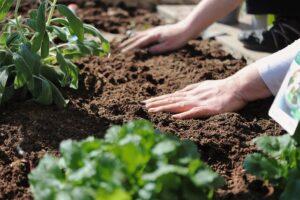MTT: a priority task is to preserve the productivity of domestic soils
On Wednesday, the Hungarian Soil Association (MTT) is holding an awareness-raising campaign day at around half a hundred points in the country – Agroinform.hu wants to draw the public’s attention to the condition and importance of topsoil.

(Photo: Pixabay)
Agroinform.hu announced in its statement on Tuesday MTT specialists excavate a soil profile and demonstrate how the soil works. Agroinform.hu points out: due to intensive cultivation technologies, the productivity and water and carbon sequestration capacity of most of the domestic farmlands are gradually falling. This can be traced back to the reduction of the organic matter content of the soil and the deterioration of the soil structure. Endre Dobos, MTT’s president, highlighted in the announcement: the amount of agricultural land removed from cultivation, over-cultivation, and the incorrect use of chemicals, as well as the climate crisis, shows an alarming rate in Europe as well. At least 60-70 percent of the continent’s soils are diseased, and Hungarian soils are not doing well either, since 90-100 percent of cultivated soils are affected by the so-called soil degradation processes. As a result of the decrease in the organic matter content of soils, the number of useful organisms living in the soil and ensuring the supply of organic matter (bacteria, fungi, earthworms, etc.) also falls, so the soil cannot regenerate, or only to a small extent. Intensive agriculture gradually depletes the soil’s carbon reserves, and also reduces the proportion of microelements that nitrogen-based fertilization cannot replace – Agroinform explained.
Degraded soil becomes silty and compacted
The compact, rock-hard soil surface behaves like concrete in the heat of the day, increasing heat and drought. In the rain, however, it is not able to absorb the moisture, so a significant part of it flows away from the area. In addition, water runoff significantly increases the risk of subsequent drought damage, they added. Endre Dobos emphasized: restoring the soil structure can be achieved through regenerative farming, which can reduce water runoff by 50 percent and erosion by up to 90 percent, while the organic matter accumulating in the soil permanently extracts carbon dioxide from the air.
MTI
Related news
State compensation for the victims of Bászna Gabona Zrt. has been completed
🎧 Hallgasd a cikket: Lejátszás Szünet Folytatás Leállítás Nyelv: Auto…
Read more >In 2025, FruitVeB considered the support and professional coordination of the TÉSZs as its priority task
🎧 Hallgasd a cikket: Lejátszás Szünet Folytatás Leállítás Nyelv: Auto…
Read more >Related news
Innovations, success stories and awards on the same stage
🎧 Hallgasd a cikket: Lejátszás Szünet Folytatás Leállítás Nyelv: Auto…
Read more >Farewell day at the 60th anniversary EuroShop trade fair
🎧 Hallgasd a cikket: Lejátszás Szünet Folytatás Leállítás Nyelv: Auto…
Read more >NAV: Women’s Day inspections begin
🎧 Hallgasd a cikket: Lejátszás Szünet Folytatás Leállítás Nyelv: Auto…
Read more >









